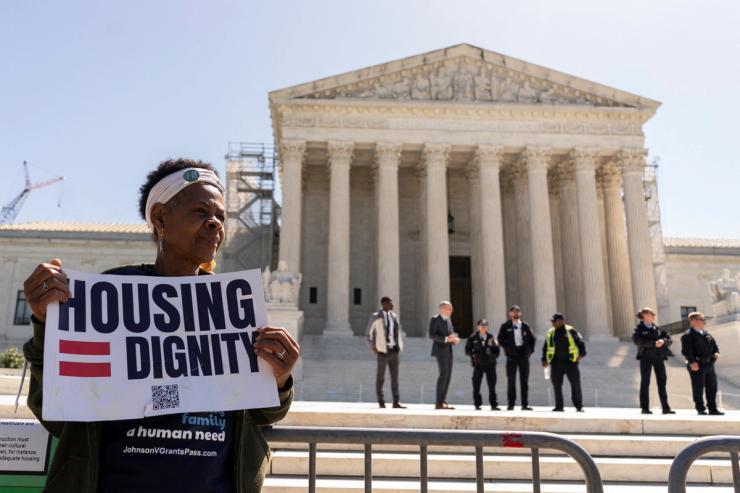The News
A majority of US Supreme Court justices appeared poised Monday to allow a city in Oregon to ban homeless people from sleeping or camping in public spaces, in a case that could have implications for cities across the US.
A group of homeless individuals sued the small city of Grants Pass after it barred them from sleeping in any public property or park, with violations punishable by fines of $295 or up to 30 days in jail. In their case, the plaintiffs cited the Constitution’s Eighth Amendment protections against cruel and unusual punishment.
The court’s three liberal justices suggested that laws passed by the city go too far by criminalizing the basic human need of sleeping, while its conservative majority indicated that they believe local policymakers should set their own rules on how to handle homelessness.
“Where do we put them if every city, every village, every town lacks compassion and passes a law identical to this?” Liberal Justice Sonia Sotomayor asked the lawyer for Grants Pass. “Where are they supposed to sleep? Are they supposed to kill themselves, not sleeping?”
A decision on the case is expected by early summer.
SIGNALS
Case could have big implications for how US handles homelessness
This case could have “sweeping implications for how the country deals with a growing homelessness crisis,” The New York Times reported. Local officials argue that if the justices side with the plaintiffs, they would “fuel homeless encampments across the country and hamstring the ability of local governments to respond,” the newspaper noted.
Conservative and liberal leaders alike want the court to make a decision so they have clarity on the rights of the homeless to camp and the rights of cities to clear those camps.
The Biden administration argued that while local governments should not be allowed to criminalize homelessness, the injunction issued by the 9th Circuit might be too broad and could “limit cities’ ability to respond appropriately and humanely to encampments and other legitimate public health and safety concerns.”
Law makes homelessness ‘someone else’s problem’
While government officials say the ordinance is necessary for maintaining public safety, Liberal Justice Elena Kagan told the city’s lawyer that the laws go far beyond this, and make it so that a homeless person “can’t take a blanket and sleep some place without it being a crime,” Reuters reported.
And the plaintiffs’ lawyer argued that all the Grants Pass laws do is “turn the city’s homelessness problem into someone else’s problem by forcing its homeless residents into other jurisdictions.” Even Mayor Sara Bristol acknowledged that reality, telling the Associated Press that if the Supreme Court sides with her city, “we still have 200 people who have to go somewhere.”
UK also grappling with whether to criminalize sleeping outside
Members of the British parliament are rebelling against their own ministers over a crime bill that would allow police in England and Wales to fine and potentially jail homeless people sleeping outside who are deemed to be causing a “nuisance.”
“A lot of colleagues believe that the bill as it stands is completely unacceptable because it would have the effect of criminalizing people who have no choice but to sleep on the streets,” one member of parliament said.
The Big Issue, a UK magazine distributed by homeless people, compared the bill to similar measures taken by local authorities in the US, noting that the measures “led to vulnerable adults developing long-standing criminal records for acts as minor as ‘possession of a shopping cart.’”



